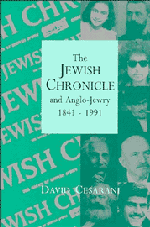Book contents
- Frontmatter
- Contents
- Preface
- Acknowledgements
- Introduction
- 1 Origins and pioneers, 1841–1855
- 2 Defining an identity: the Jewish Chronicle and mid-Victorian Anglo-Jewry, 1855–1878
- 3 The era of Asher Myers and Israel Davis, 1878–1906
- 4 The hegemony of Leopold Greenberg, 1907–1931
- 5 Discordant interlude: J. M. Rich and Mortimer Epstein, 1932–1936
- 6 Ivan Greenberg and the crisis years, 1937–1946
- 7 The post-war era: J. M. Shaftesley and David Kessler, 1946–1958
- 8 The Jewish Chronicle under William Frankel, 1958–1977
- 9 The Jewish press in a divided community: Geoffrey Paul, 1977–1990
- Conclusion
- Notes
- Bibliography
- Index
- Plate section
8 - The Jewish Chronicle under William Frankel, 1958–1977
Published online by Cambridge University Press: 22 September 2009
- Frontmatter
- Contents
- Preface
- Acknowledgements
- Introduction
- 1 Origins and pioneers, 1841–1855
- 2 Defining an identity: the Jewish Chronicle and mid-Victorian Anglo-Jewry, 1855–1878
- 3 The era of Asher Myers and Israel Davis, 1878–1906
- 4 The hegemony of Leopold Greenberg, 1907–1931
- 5 Discordant interlude: J. M. Rich and Mortimer Epstein, 1932–1936
- 6 Ivan Greenberg and the crisis years, 1937–1946
- 7 The post-war era: J. M. Shaftesley and David Kessler, 1946–1958
- 8 The Jewish Chronicle under William Frankel, 1958–1977
- 9 The Jewish press in a divided community: Geoffrey Paul, 1977–1990
- Conclusion
- Notes
- Bibliography
- Index
- Plate section
Summary
Angry young men and Anglo-Jewry, 1958–1967
John Shaftesley had originally been appointed acting editor as a stop gap while Kessler and the Board found someone of higher calibre to fill the post. He remained in the editorial chair for twelve years, because it proved difficult to find anyone suitable who could take over at once. As a solution to the Board's dilemma, it was decided to recruit a non-journalist and groom him for the job. In April 1955, William Frankel, a barrister, was appointed general manager to replace A. B. Guthrie on his retirement. Three years later, Shaftesley was made an executive director and assigned responsibility for the Jewish Gazette in Manchester. Frankel took his place as editor of the Jewish Chronicle.
William Frankel was born in 1917 in Whitechapel, east London. His parents had come to Britain from Przemysl, in Galicia, about six years earlier. After a spell in business his father settled down to a modest career as a synagogue official. William, the second of three sons, was born in a one-up, one-down terraced house in Eastman's Court, off Petticoat Lane. He grew up in a closed environment of shtiebels and chedarim, and was educated at the Jews' Free Infants' School, Berner Street School and St George's-in-the-East Central School. This qualified him for a humdrum clerical position, but two of William's teachers encouraged him to sit the exams for secondary school. He passed and went to the Regent Street Polytechnic School, far from the East End.
- Type
- Chapter
- Information
- The Jewish Chronicle and Anglo-Jewry, 1841–1991 , pp. 210 - 235Publisher: Cambridge University PressPrint publication year: 1994



